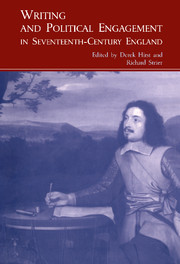Book contents
- Frontmatter
- Contents
- Notes on contributors
- Dedication
- Introduction
- 1 “I am Power”: normal and magical politics in The Tempest
- 2 “Void of storie”: the struggle for insincerity in Herbert's prose and poetry
- 3 Sir Kenelm Digby's rewritings of his life
- 4 Thomas Hobbes and the Renaissance studia humanitatis
- 5 Casuistry and allegiance in the English Civil War
- 6 Thomas May and the narrative of civil war
- 7 Samuel Parker, Andrew Marvell, and political culture, 1667–73
- 8 Sidney's Discourses on political imagoes and royalist iconography
- Notes
- Index
2 - “Void of storie”: the struggle for insincerity in Herbert's prose and poetry
Published online by Cambridge University Press: 09 September 2009
- Frontmatter
- Contents
- Notes on contributors
- Dedication
- Introduction
- 1 “I am Power”: normal and magical politics in The Tempest
- 2 “Void of storie”: the struggle for insincerity in Herbert's prose and poetry
- 3 Sir Kenelm Digby's rewritings of his life
- 4 Thomas Hobbes and the Renaissance studia humanitatis
- 5 Casuistry and allegiance in the English Civil War
- 6 Thomas May and the narrative of civil war
- 7 Samuel Parker, Andrew Marvell, and political culture, 1667–73
- 8 Sidney's Discourses on political imagoes and royalist iconography
- Notes
- Index
Summary
“OH THAT I ONCE PAST CHANGING WERE”
In a somewhat neglected poem of George Herbert's entitled “A Dialogue Anthem,” two characters, Christian and Death, debate the shape of history, both personal and cosmic. Christian tauntingly asks, “Alas, poore Death, where is thy glorie? / Where is thy famous force, thy ancient sting?” and Death replies in kind, “Alas poore mortall, void of storie, / Go spell and reade how I have kill'd thy King.” We are meant to see of course that Death completely misunderstands or misreads the situation: he thinks that because Christ has died, there is no longer any center to Christian's life, nothing in relation to which his actions could have meaning; but Christian knows that meaning, and the continuation of his story, is assured by Christ's death, an act of self-sacrifice that rescues man from the death-sentence (separation from deity) earned by Adam and Eve in Eden. It is only because of Christ's death that man will live.
But live how? The answer to this question reveals a further irony in Death's accusation, “void of storie”; for, correctly understood, it is not an accusation at all, but a precise specification of the requirement that Christ's sacrifice imposes, the requirement that the Christian not have a story of his own, that he be, in that impossible and perhaps inconceivable sense, void of story. The logic is familiar in Christian thought.
- Type
- Chapter
- Information
- Publisher: Cambridge University PressPrint publication year: 2000

